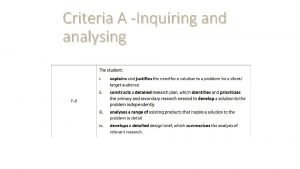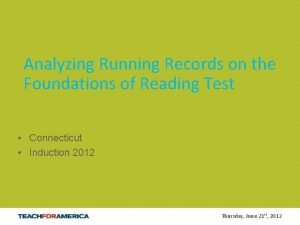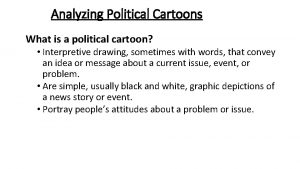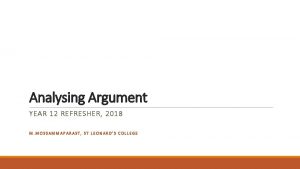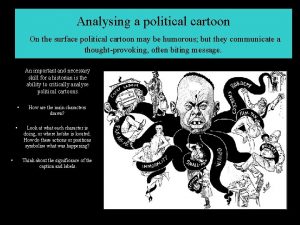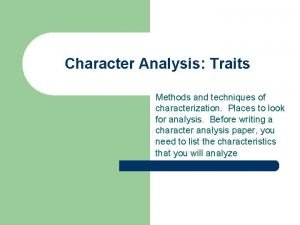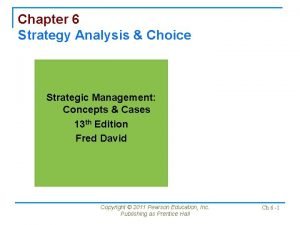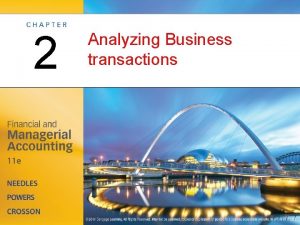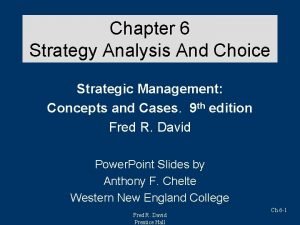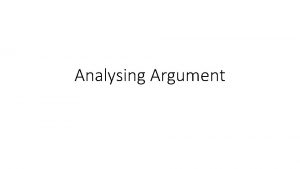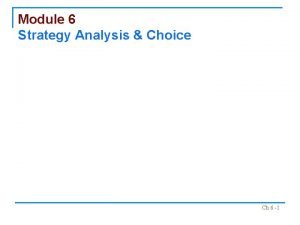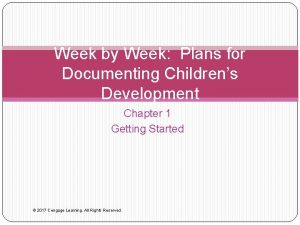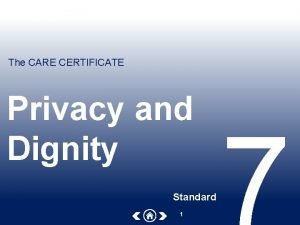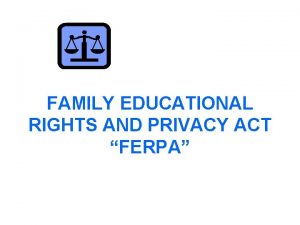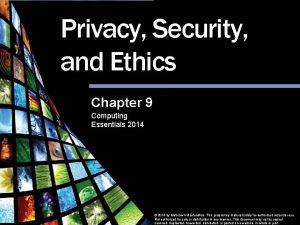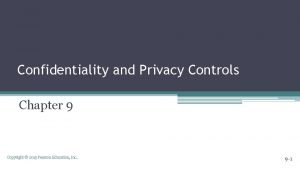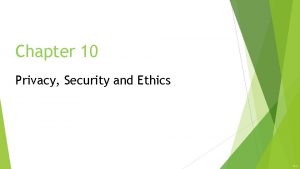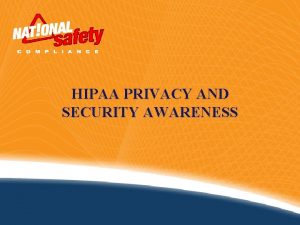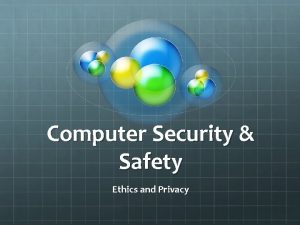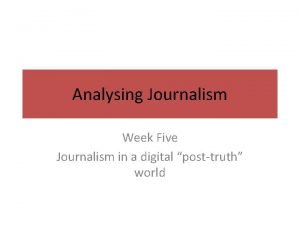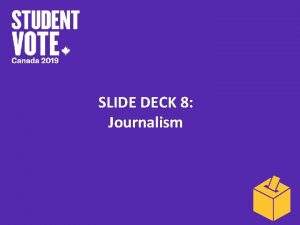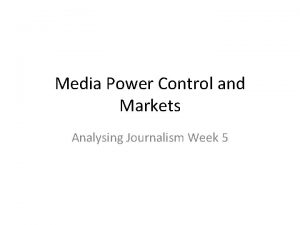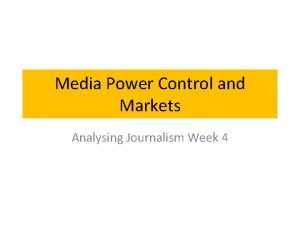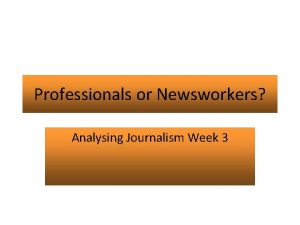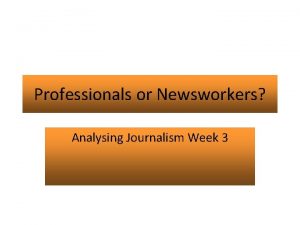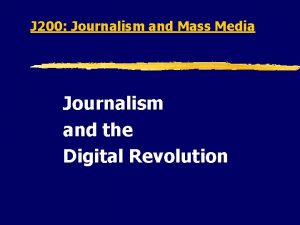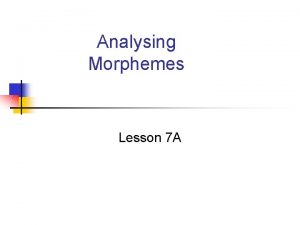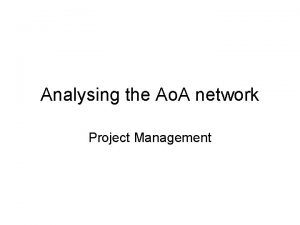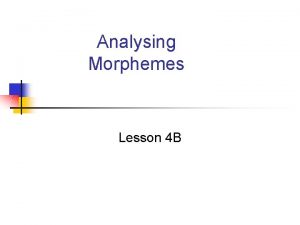Privacy and Press Regulation Analysing Journalism Week 10




























- Slides: 28

Privacy and Press Regulation Analysing Journalism Week 10

Aims • To Place Contemporary Debates about Press Regulation in Context • To consider the arguments over The Leveson Report • To relate these debates to the second assignment (essay 5)

Philosophical Issues • Liberal arguments for freedom of the press • Progress and the creation of a “good” society depends upon the free circulation of ideas • Debate and argument sifts good ideas from bad • Good government depends upon open scrutiny John Stuart Mill 1803 -1876

But some tensions … • Liberal philosophers also argued that “good” societies protected individual freedoms • Is there a tension between the values associated with the circulation of ideas (e. g. a free press) and the values of individual freedom? • Might press freedom sometimes threaten individual freedom (e. g. the individual’s right to privacy)?

Press Regulation in the UK • Historical reliance upon self-regulation – contrasts to UK broadcasting and the regulation of the press in other European countries e. g. France, Germany, Norway • Throughout C 19 and C 20 up to 1949 no system of regulation – no protections from press intrusion • But frequent calls for regulation – even from the NUJ • 1949 First Royal Commission on the Press – held back from statutory regulation. Set up Press Council (industry controlled).

Press Regulation in the UK • 1962 Royal Commission • 1972 Younger Report on Privacy • 1977 Royal Commission …. all retreated from stronger regulation • Key question: why were politicians of all parties so wary of press regulation?

Why things changed…a little • Late 80 s and early 1990 s a series of scandals involving government ministers exposed in the press • Press coverage of the Royal Family • 1997 death of Diana

The Press Complaints Commission • 1991 Calcutt Committee recommends new system of voluntary regulation independent of the newspaper industry • But government supports a 50: 50 system (50% non-newspaper representatives) • New Code of Practice – complainants right to refer newspaper articles to the PCC

Back to Philosophy • Press freedom versus individual rights • The PCC code tried to balance these: The code “protects the rights of the individual…and upholds the public’s right to know. ” “All members of the press have a duty to maintain the highest professional and ethical standards…”

The Public Interest Defence • The PCC code requires journalists not to obtain information by intruding upon individual privacy or private property … • Except where it can be demonstrated that it is in the public interest for information obtained in such a way to enter the public domain. • So is the public interest more than simply ‘what interests the public’?

Some examples … • Daily Mirror defence of revealing David Mellor’s affair with actress – ministerial fatigue as a matter of public interest? ? ? Or … “Scottish wife-swappers are risking all with deadly party games that amount to nothing more than AIDs roulette. Hardened News of the World reporters have been appalled to witness couples happily engaging in unprotected sex. ” N of W used the public interest defence here

The Human Rights Act 1998 • Incorporates the European Convention on Human Rights into UK law • Article 10 confirms the right of ‘freedom of expression’ and requires courts to consider the public interest and also whether information is already in the public domain before granting ‘prior restraint’ • But …

The Human Rights Act • Article 8 confirms the individual’s right to privacy • Naomi Campbell Wins Privacy Case • John Terry uses ‘super injunction’ but eventually overturned on appeal http: //www. guardian. co. uk/me dia/2010/jan/31/john-terrygovernment-concern-superinjunctions

Debate over key privacy rulings • Max Mosely and the News of the World October 2008 • http: //www. guardian. co. uk/media/2008/n ov/10/privacy-rulings • http: //www. out-law. com/page-9570 • Sienna Miller wins £ 35, 000 privacy settlement November 2008 • http: //www. out-law. com/page-9488

Mr Justice Eady • One judge has played a particular role in interpreting the Human Rights Act • Justice Eady rulings • Ryan Giggs and Max Mosley cases

The current ‘privacy debate’ "Eady effectively ruled that it’s perfectly acceptable for the multimillionaire head of a multi-billion sport that is followed by countless young people to pay five women £ 2, 500 to take part in acts of unimaginable sexual depravity with him, " said Dacre (editor of Daily Mail) 2008. Dacre complains that one unelected judge is effectively making a privacy law Question: is this just a teeny bit self-serving as an argument?

On the other hand… • Mosley and the Mc. Cann’s gave evidence to the House of Commons Select Committee (March 2009) • Even the rich and famous have rights to privacy • A liberal society must recognise the right of privacy even for behaviour which is unappealing but lawful • Journalists are not the best equipped people to act as moral arbiters (!) • http: //www. guardian. co. uk/commentisfree/2009 /mar/11/medialaw-mosley

Then Came Leveson… • Established after Guardian publishes evidence of News of World hacking Millie Dowler and Mc. Cann phones in 2011 • Evidence of over 4, 775 victims of hacking • PCC had fully exonerated News of World • BBC summary of leveson • Guardian summary of Leveson

… there have been too many times when , chasing the story, parts of the press have acted as if its own code, which it wrote, simply did not exist. This has caused real hardship … and wreaked havoc with the lives of innocent people. Lord Leveson

Leveson Concludes • PCC has failed to regulate • New regulatory body required fully independent of the newspaper industry and of government • New body to be established by the industry but monitored by a statutory body • New system of arbitration for victims • Whistle blowing system for journalists

What Happened then? • Newspaper industry rejects Leveson • Despite the Leveson suggestion that papers should be liable to full-costs of court cases if they refused to co-operate with the new regulator • The industry establishes its own regulator: • Independent Press Standards Organisation •

What Happened Then? • IPSO establishes The Editors' Code • This is what papers now follow but. . • Back to industry self-regulation? • Watch this space. . • Meanwhile one of the wealthier supporters of Hacked off sets up an alternative • Impress

The crucial issues • In an age when information is commodified • Who owns and controls information relating to our private lives? • Those with economic or legal power? • ‘Ordinary citizens’? • Those with ‘celebrity power’? • How is the balance between privacy and public interest achieved?

Nick Davies on phone hacking • https: //www. youtube. com/watch? v=y 57 KA n. D 8 gtw

Seminar • Would you choose Public interest or right to Privacy in the following cases? • A senior Cabinet Minister having an affair with their Special Advisor • A Senior Politician having an affair with their Special Advisor who is Russian

Seminar • The father of a missing child is rumoured to be having an affair • The size of the annual bonus received by a top banker at Royal Bank of Scotland • Photographs of the top banker spending his annual bonus on white powder and ‘escorts’ in hotel bedroom

Seminar • A top footballer and England captain is found to be cheating with the girlfriend of another England player • Rumours that a local Priest has a history of sexual abuse with under age children • Rumours that a local Catholic priest is in a relationship with his house keeper

Key Questions • How should the public interest be defined? • Where are the limits of privacy to be defined? • Are the press right to be fearful of Leveson? • Or should there be stronger measures as suggested by… • CPBF
 Privacy awareness and hipaa awareness training cvs
Privacy awareness and hipaa awareness training cvs Conventional journalism
Conventional journalism Literary journalism vs traditional journalism
Literary journalism vs traditional journalism Inquiring and analysing
Inquiring and analysing Analysing running records
Analysing running records Political cartoons
Political cartoons Analysing argument
Analysing argument Analysing consumer market
Analysing consumer market The chinese pest cartoon
The chinese pest cartoon Methods of characterization
Methods of characterization Matching stage in strategic management
Matching stage in strategic management Content form process mood
Content form process mood Analysis of business transactions
Analysis of business transactions Strategy analysis and choice largely involves making
Strategy analysis and choice largely involves making Analysing argument
Analysing argument Analysing the 6 strategic options megxit
Analysing the 6 strategic options megxit Analysing market data
Analysing market data Week by week plans for documenting children's development
Week by week plans for documenting children's development Standard 7 privacy and dignity
Standard 7 privacy and dignity Microsoft azure security privacy and compliance
Microsoft azure security privacy and compliance Ferpa hipaa
Ferpa hipaa Chapter 9 privacy security and ethics
Chapter 9 privacy security and ethics Chapter 9 privacy security and ethics
Chapter 9 privacy security and ethics Family educational rights and privacy act of 1974
Family educational rights and privacy act of 1974 Confidentiality and privacy controls
Confidentiality and privacy controls Chapter 9 privacy security and ethics
Chapter 9 privacy security and ethics Three primary privacy issues are accuracy property and
Three primary privacy issues are accuracy property and Hipaa privacy and security awareness training
Hipaa privacy and security awareness training What is the destructive event or prank the virus delivers
What is the destructive event or prank the virus delivers



